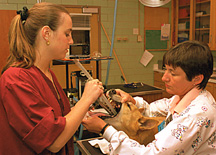 Purdue News
Purdue News
 Purdue News
Purdue News

|
"Pets and animals continue to become more important to their owners, and that has led to not only more veterinarians in practice, but also many specialty practices," explains Lukens, director of Purdue's veterinary technology program. "We are seeing more and more practices limited to just one species of animal like cats or birds, and there has also been an increase in the number of DVM's specializing in areas like dermatology, ophthalmology and surgery."
This growth has increased the demand for veterinary technicians and technologists, who perform duties similar to a medical technician or nurse in the field of human medicine. In 1996, there were four job openings for every vet tech graduate in the United States, and Lukens anticipates that opportunities in the field will remain steady for the next few years.
"It's not just a matter of more veterinary practices, but the way those practices are managed," Lukens says. "The technology available to veterinarians now parallels that of human medicine, with anesthesia machines, laboratory testing and imaging equipment. Veterinarians used to do all the technical procedures themselves, but that's just not cost-effective any more."
By delegating medical tasks to certified veterinary nursing and lab technicians, the veterinarian is able to focus on diagnosis and treatment plans, as well as the more advanced procedures that require a doctor's degree.
"This division of duties allows vets to see more animals while improving the level of care at all stages of treatment," Lukens says.
Purdue's School of Veterinary Medicine has responded to the growing demand for technicians and technologists by offering a bachelor of science degree in veterinary technology beginning in the fall of 1998.
The new curriculum will be available in both a traditional four-year format for incoming freshman and as a two-year curriculum for alumni of Purdue's associate degree veterinary technology program or alumni of the other 61 accredited two-year college programs nationwide. This will be the 11th bachelor's degree program in veterinary technology in the country to be accredited by the American Veterinary Medical Association.
Lukens says graduates will be able to perform a wide range of veterinary nursing, imaging, anesthesia and diagnostic laboratory procedures as well as supervise staff in veterinary hospitals, animal facilities and research centers. They also will be qualified for clinical teaching positions in the 27 veterinary education institutions nationwide.
Purdue's existing associate degree program has a placement rate of 97 percent and very low attrition. One hundred and eighty positions were listed with the program office for its 28 graduates last year. The national average starting salary in January 1996 was $18,900 for technicians, although Purdue graduates were offered an average of $21,000.
"We expect the successful four-year graduate to average several thousand dollars more than that and have more upward mobility in the profession," Lukens says.
Source: Roger Lukens, (765) 494-7619; e-mail, rll@vet.purdue.edu
Writer: Sharon Bowker, (765) 494-2077; e-mail, sharon_bowker@purdue.edu
Purdue News Service: (765) 494-2096; e-mail, purduenews@purdue.edu
Photo Caption
Makki Beckett, a second-year Purdue veterinary technician student from Dillsboro,
Ind., prepares to anesthetize a dog at the university's Small Animal Hospital while
medical nursing technologist Becky Thayer assists. The dog had swallowed a fish hook
that became stuck in its throat. (Purdue News Service Photo by Vince Walter)
Color photo, electronic transmission, and Web and ftp download available. Photo ID:
Lukens/Vet. tech
Download here.